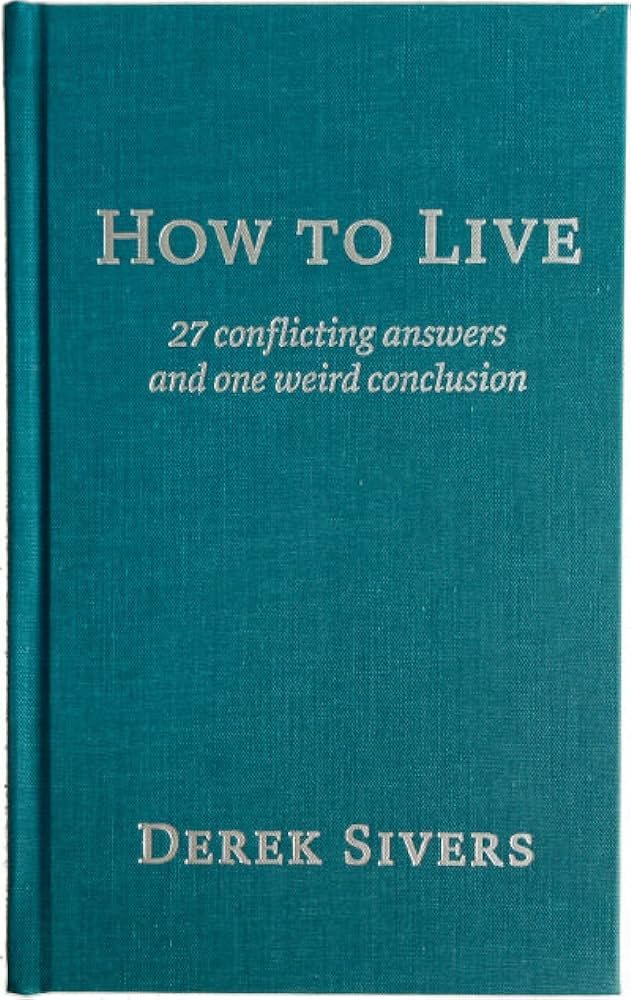Useful Not True by Derek Sivers
Date read: 6/17/24. Recommendation: 9/10.
One of my favorite things about Derek’s book is that he never tells you what to do. There’s never a checklist at the end of each chapter pretending to give you the answer or steps to follow. His books are just observations and stories. The value is in how you see yourself reflected and the connections they lead you to. In Useful Not True, Derek invites us to reframe our ideas around adopting thoughts because they’re useful, not because they’re inherently true. My favorite chapters focus on choosing beliefs for the actions they lead to, meaning as something that’s all our own, and judging individual ideas rather than attempting to classify someone as exclusively one thing—brilliant, foolish, right, wrong, etc. There is no other writer who is as succinct and thought-provoking.
Check out my notes below and Derek’s website to grab your copy.
My Notes:
“This book is about reframing. It should persuade you to adopt thoughts because they’re useful to you, not because they’re true.” Derek Sivers
Perspective:
Your perspective might be useful but it’s not the entire picture. “No picture is the whole picture. Everyone selects an angle and presents just one point of view.” Derek Sivers
Ground yourself in today’s actions:
People claim the power of visualization but none of us know how we’re going to react to what happens. It could be surprisingly good or bad once you get beneath the surface (Parable of the Chinese Farmer). Focus on today’s actions.
Judgments disguised as facts:
“People try to pass off judgements as facts. For example:
Calling someone ‘needy’ means ‘I couldn’t give that person what they wanted.’
Calling someone ‘stubborn’ means ‘That person didn’t give me what I wanted.’
Notice that words like these sound like facts about the person being judged, but they tell you more about the person judging.” Derek Sivers
Rewrite the rules:
“Rules set expectations and the terms of the game. They’re a useful starting point, but they’re not the final answer.” Derek Sivers
“The world is as negotiable as a flea market in Marrakesh. Only a fool doesn’t haggle. Whenever presented with rules, think of it as a game that can be changed.” Derek Sivers
Being wrong isn’t a threat:
Adopt a scout mindset (see Julia Galef): “It’s helpful to be wrong or confused. Being wrong makes you try a different approach. Feeling confused makes you clarify or question your assumptions. It’s intellectual humility.” Derek Sivers
Experiencing events that aren’t actually happening:
We can’t waste so much of our lives spiraling through arguments, conflicts, and threats in our heads when, in reality, actual events aren’t nearly that dire. Imaginary conversations are an obsessive trick we use to keep ourselves safe. Not everyone is an enemy. Not every passing comment is a threat. No one is spending that much time thinking about or plotting against you.
You are the strange one:
“Did ancient people really worship Zeus, Athena, Odin, Loki, Thor and all of that? They knew those were just stories, right? Foreigners have weird beliefs we call superstitions. But when it comes to our own beliefs? No no no! Those are just true!” Derek Sivers
Use beliefs to your advantage:
“Beliefs cause emotions. Emotions cause actions. Choose a belief for the action it will cause.” Derek Sivers
“What is the point of beliefs if they don’t shape actions?” Derek Sivers
Judge the contents not the box:
Best-selling book filled with wisdom but a few sentences were found to be plagiarized so people dismiss the whole book. “That’s the problem with judging a box instead of its contents. It’s seeking ‘true’ instead of useful. When any aspect of a package is flawed, it no longer feels ‘true’, so all of it is discarded. Then you lose the benefits — the baby with the bathwater.” Derek Sivers
One idea you disagree with doesn’t mean a person is “bad” or “unintelligent.” People can have both good ideas and bad ideas.
Meaning:
“Nothing has inherent meaning. Whatever meaning you project into it is your own.” Derek Sivers
Meanings are useful, not true: “Meanings can help you feel your life is important, with a narrative and purpose. Meanings can help you make peace with events out of your control. Meanings can give you a reason to persist in difficult times. But they’re internal, not external. They’re yours, not others’.” Derek Sivers
Let your voice evolve:
“Great artists change their trademark style, to keep growing. Stop defining yourself in a limiting and over-simplified way. You have different aspects to your personality…Directions take turns. Going one way can work until it doesn’t. To get you where you want to go next, what direction is needed?” Derek Sivers
Is it useful? What are you going to do with it?
“Instead of asking if it’s true, ask yourself if it’s useful to you.” Derek Sivers


